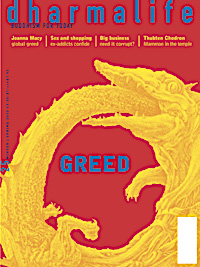At Hell's Gate
A Soldier's Journey from War to Peace
Author: Claude Anshin Thomas Shambhala 2004, $19.95 h/b
In the Samyutta Nikaya a professional soldier asks the Buddha whether a soldier who dies in battle is reborn in a special heaven. Initially the Buddha declines to answer, but when the man persists, the Buddha replies that soldiers are actually reborn in a hell or as an animal.
If one accepts that hell can be a state of mind, Claude Anshin Thomas' new book, At Hell's Gate: A Soldier's Journey from War to Peace is a powerful validation of the Buddha's insight. Much decorated in Vietnam, Thomas returned to the us to be overwhelmed by guilt, rage and sorrow resulting from the hundreds of people he had killed, the cruelties he had witnessed and his narrow escapes from death.
Faced with rejection and abandonment by the very society he believed he had been defending, Thomas struggled with post-traumatic stress leading to drug and alcohol addiction, abandonment of wife and child and, ultimately, homelessness.
Thomas' first step back from the brink was in 1983 when he entered a programme for drug and alcohol addiction. Success at overcoming these intoxicants led him to give up everything from caffeine to nicotine, preparing the way for a life-changing encounter. In the fall of 1990 he participated in a retreat that Vietnamese Zen master Thich Nhat Hanh had designed especially for war veterans.
Thomas was deeply moved when Thich Nhat Hanh told the participants: 'You veterans are the light at the tip of the candle. You burn hot and bright. You understand deeply the true nature of suffering'. He also informed them that the only way to heal, to transform their suffering, was to stand face-to-face with suffering, to realise the intimate details of suffering and how their life in the present is affected by it. By doing this, the Vietnamese master explained, the veterans had the potential to become a powerful force for healing in the world.
The remainder of Thomas' book makes clear that he took Thich Nhat Hanh's words to heart. Not only did he confront his own pain through the practice of mindfulness meditation, he also became a powerful force for healing - especially in those many places throughout the world where wars continue to rage. Entering the Soto Zen priesthood, Thomas once again embraced homelessness - but this time it was the homelessness of a mendicant monk seeking to bring understanding and compassion to a world overcome with hatred, greed and delusion.
If I have any difference with the author, it is when he states, in discussing war victims, that 'Those lives have been sacrificed to help us wake up to the senselessness of war'. This raises the question: sacrificed by whom? By God? By karma? Whether he intended it or not, regarding the death of millions as part of some grand plan to wake up others, sounds suspiciously like the ends justifying the means.
Yet, I am in complete agreement with Thomas when he explains that war is not something that merely happens externally to us. It represents a collective expression of individual suffering, and if we want war to stop, each one of us must wake up. In Thich Nhat Hanh's words, each one of us must 'be peace'.
Thomas' unvarnished portrait of himself demonstrates once again the power of Buddhist practice to liberate individuals from suffering, not through a miraculous intervention, but by painstakingly examining the origin and nature of suffering, mindfully breathing in and breathing out, and living fully in the present moment.
By revealing the power of Buddhist practice to heal a deeply broken spirit, At Hell's Gate offers hope to all those who find themselves engulfed in one or another of the world's manifold hells.
Brian Victoria is the author of Zen at War and Zen War Stories



